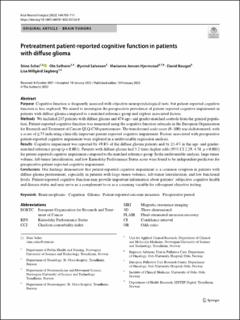| dc.contributor.author | Schei, Stine | |
| dc.contributor.author | Solheim, Ole | |
| dc.contributor.author | Salvesen, Øyvind | |
| dc.contributor.author | Hjermstad, Marianne Jensen | |
| dc.contributor.author | Bouget, David Nicolas Jean-Marie | |
| dc.contributor.author | Sagberg, Lisa Millgård | |
| dc.date.accessioned | 2022-12-02T11:36:28Z | |
| dc.date.available | 2022-12-02T11:36:28Z | |
| dc.date.created | 2022-02-11T16:00:38Z | |
| dc.date.issued | 2022 | |
| dc.identifier.citation | Acta Neurochirurgica. 2022, 164, 703-711. | en_US |
| dc.identifier.issn | 0001-6268 | |
| dc.identifier.uri | https://hdl.handle.net/11250/3035595 | |
| dc.description.abstract | Purpose:
Cognitive function is frequently assessed with objective neuropsychological tests, but patient-reported cognitive function is less explored. We aimed to investigate the preoperative prevalence of patient-reported cognitive impairment in patients with diffuse glioma compared to a matched reference group and explore associated factors.
Methods:
We included 237 patients with diffuse glioma and 474 age- and gender-matched controls from the general population. Patient-reported cognitive function was measured using the cognitive function subscale in the European Organisation for Research and Treatment of Cancer QLQ-C30 questionnaire. The transformed scale score (0–100) was dichotomized, with a score of ≤ 75 indicating clinically important patient-reported cognitive impairment. Factors associated with preoperative patient-reported cognitive impairment were explored in a multivariable regression analysis.
Results:
Cognitive impairment was reported by 49.8% of the diffuse glioma patients and by 23.4% in the age- and gender-matched reference group ( p < 0.001). Patients with diffuse glioma had 3.2 times higher odds (95% CI 2.29, 4.58, p < 0.001) for patient-reported cognitive impairment compared to the matched reference group. In the multivariable analysis, large tumor volume, left tumor lateralization, and low Karnofsky Performance Status score were found to be independent predictors for preoperative patient-reported cognitive impairment.
Conclusions:
Our findings demonstrate that patient-reported cognitive impairment is a common symptom in patients with diffuse glioma pretreatment, especially in patients with large tumor volumes, left tumor lateralization, and low functional levels. Patient-reported cognitive function may provide important information about patients’ subjective cognitive health and disease status and may serve as a complement to or as a screening variable for subsequent objective testing. | en_US |
| dc.language.iso | eng | en_US |
| dc.publisher | Springer | en_US |
| dc.rights | Navngivelse 4.0 Internasjonal | * |
| dc.rights.uri | http://creativecommons.org/licenses/by/4.0/deed.no | * |
| dc.subject | Brain neoplasms | en_US |
| dc.subject | Cognition | en_US |
| dc.subject | Glioma | en_US |
| dc.subject | Patient-reported outcome measures | en_US |
| dc.subject | Preoperative period | en_US |
| dc.title | Pretreatment patient-reported cognitive function in patients with diffuse glioma | en_US |
| dc.title.alternative | Pretreatment patient-reported cognitive function in patients with diffuse glioma | en_US |
| dc.type | Peer reviewed | en_US |
| dc.type | Journal article | en_US |
| dc.description.version | publishedVersion | en_US |
| dc.rights.holder | © The Author(s) 2022 | en_US |
| dc.source.pagenumber | 703-711 | en_US |
| dc.source.volume | 164 | en_US |
| dc.source.journal | Acta Neurochirurgica | en_US |
| dc.identifier.doi | 10.1007/s00701-022-05126-9 | |
| dc.identifier.cristin | 2000667 | |
| cristin.ispublished | true | |
| cristin.fulltext | original | |
| cristin.qualitycode | 1 | |

